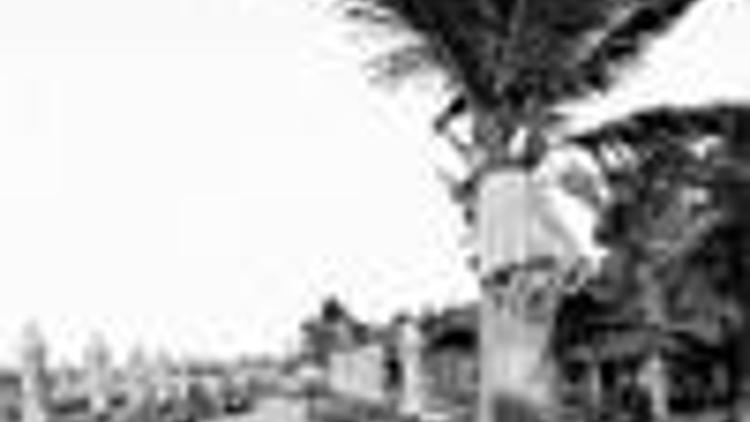Turkish investors eye Middle East
Güncelleme Tarihi:

ISTANBUL - Despite the deepening global credit crunch, the Middle East and the Persian Gulf are still attractive for Turkish investors. Turkish companies may grab great opportunities and increase trade volumes in the upcoming period.
The Middle East and the Persian Gulf region, which does not consider cutting public investments despite the deterioration of oil prices, are still popular markets for Turkish investors.
The regions, which attract investors due to their accumulated wealth, offer great opportunities particularly for Turkish contractors. Turkey’s annual export volume to the region currently stands at $8.3 billion, signaling a significant potential with its geographical as well as cultural closeness. The figure is expected to triple within five years.
Turkish firms have grabbed global orders worth $110 billion, and these regions constitute $60 billion of the firms’ business volume. Apart from contractor services, export volume has risen from $5.4 billion to $8.3 billion in two years. According to November 2008 data, Turkey’s exports rose 318 percent to Bahrain, 166 percent to the United Arab Emirates, or UAE, 151 percent to Qatar, 127 percent to Kuwait, 90 percent to Lebanon, 51 percent to Iran and 34 percent to Iraq, compared to the previous year.
Further market share
The sovereign wealth funds of Abu Dhabi, Saudi Arabia and Kuwait government constitute the world’s largest investment funds, said Korhan Kurdoğlu, chairman of the Turkish-UAE Business Council. Total fund volume under the control of Gulf countries is around $1.7 trillion, he said, adding that the figure is expected to reach $5-$6 trillion by 2015.
Noting that Gulf countries displayed an excellent growth performance of 8.5 percent between 2002 and 2008, Kurdoğlu said, "The sharp decline in oil prices will reduce growth rate and current surplus for a while. However, these countries are expected to continue creating current surplus and directing accumulated high reserves to new investments. Oil prices are expected to drop some in the first half of this year, and rally afterwards."
The global financial crisis creates investment opportunities for Turkish contractors in the region, said Erdal Eren, chairman of the Turkish Contractors Association. "China is one of the countries affected by the crisis most. The situation affects its investments in this region. It is possible for us to increase our share."
In case of overcoming the problems concerning workmanship legislation and letter of guarantee, Turkish contractors may receive businesses worth $50 billion annually, Eren said.
The Iraqi market is likely to become the most remarkable market of the new period with the start of the term of U.S. President Barack Obama, according to the Turkish-Iraq Business Council Chairman Ercüment Aksoy. Obama aims to posit the U.S. as a country that exports technology and products, rather than just consuming, Aksoy said, adding, "Obama’s approach will offer an insight also into Turkey. Turkey’s cooperation with U.S. firms particularly in energy and electricity is high on the agenda. Our exports to Iraq may reach $10 billion annually."
Noting that Iraq needs all consumption products, particularly food, Aksoy expressed the need for houses, roads, water and canalization infrastructure, hospitals and school projects. "A potential worth billions of dollars is awaiting Turkish firms," he said.
In the region, Turkey may display activity in many sectors, including food, construction materials, decoration, hotel equipments, health, education and jewelery, said Mehmet Habbab of the Foreign Economic Relations Board, or DEİK.
Ali Bayramoğlu, chairman of the Turkish-Saudi Business Council, noted that a comprehensive report is being prepared on the region’s needs and what Turkey may export. "It is possible to triple our foreign trade volume within five years," he said.
Active firms in the region
w Turkey’s leading food firms, such as Ülker, Eti, Şölen, Saray, Elvan and Beşler, operate in the region.
w TAV has undertaken Emirates Financial Towers and the world’s highest hotel-residence project in Dubai. It has also undertaken projects in Tunisia, Libya and Egypt.
w STFA, an expert in dam, tunnel and marine structures, took place in LNG facility port in Qatar, Benghazi Port in Libya, Duqm Port in Oman and a drainage channels project in Saudi Arabia.
w Garanti Koza has realized projects in Saudi Arabia and Bahrain, and is interested in projects in the UAE.
w Doğuş has undertaken a highway project in Morocco.
w Baytur has undertaken projects in Dubai.

